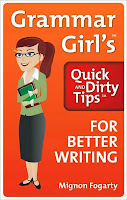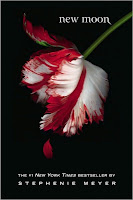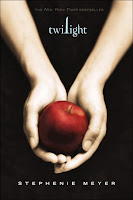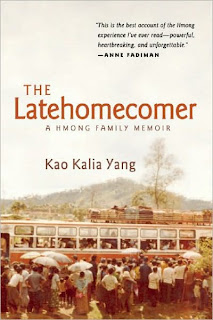I'm really enjoying the book so far.
Lang Yang starts by telling the history of her parents, who meet in the Laotian jungle as their separate families hid for their lives from enemy soldiers. They marry amongst the bombs and the fighting, and even still certain traditions remained. A dowry is a must, even if they barely had enough food to last the day.
The family (a daughter, Dawb, is born on the jungle floor) eventually makes it across to Thailand where they spend several years in different refugee camps.
Lang Yang is born here and her story begins. The following stories come from her memory (and probably some things her mother, father and grandmother told her about), and it's amazing how much she remembers, particularly smells and sounds. She's actually pretty happy in the camp (that's all she knows), but she can tell her parents yearn for a better life.
Soon the Thai government doesn't want the Hmong anymore and slowly over several years the U.S. government offers them homes here. We're the cause for why they're refugees of war anyway. (We convinced them to fight the "Secret War" against the Vietnamese and now they've been run out of their country for helping us.)
Lang Yang and her family traveled here when she's six years old.
Her stories of the airplane ride and her first month in America, St. Paul to be specific, are extremely interesting. Americans didn't know what to think about these people entering our country, and
Lang Yang and her family could tell. But her parents always stressed that their lives would be better here.
Lang Yang spends several different moments throughout the book discussing whether this is really true. With all the struggling to learn the language, the customs, living on welfare, etc., is life
really better?
As
Lang Yang and her siblings grow up, it's very interesting to read about the pressure put on them by their parents (as with all the Hmong families she knew). Hmong children have to become adults quicker - their parents need them to translate. If they're ever ungrateful or distant (typical teenagers - at least typical American teenagers), the parents' disappointment is overwhelming. The pressure to do well, to go to college, to become successful is preceded with [me paraphrasing] "We traveled all the way here to give you a better life - don't go wasting it."
I'm glad I'm reading this book, especially since
Lang Yang is near my age. She was right on the cusp of the immigration. She was born elsewhere, but spent a majority of her life here. Her younger brothers and sisters were born Americans. They'll never have those memories of Laos or Thailand. They'll never know personally the way it was - they only know the way life is now or the way it could be. I think this is a major reason why she wrote this book. Maybe she felt a sense of duty?
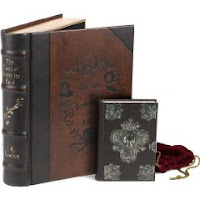 Last December, I mentioned J.K. Rowling's latest creation: the handwritten, personally illustrated, very limited edition of The Tales of Beedle the Bard, which she gave out to six special someones and auctioned off the seventh for some $4 million (for charity).
Last December, I mentioned J.K. Rowling's latest creation: the handwritten, personally illustrated, very limited edition of The Tales of Beedle the Bard, which she gave out to six special someones and auctioned off the seventh for some $4 million (for charity).